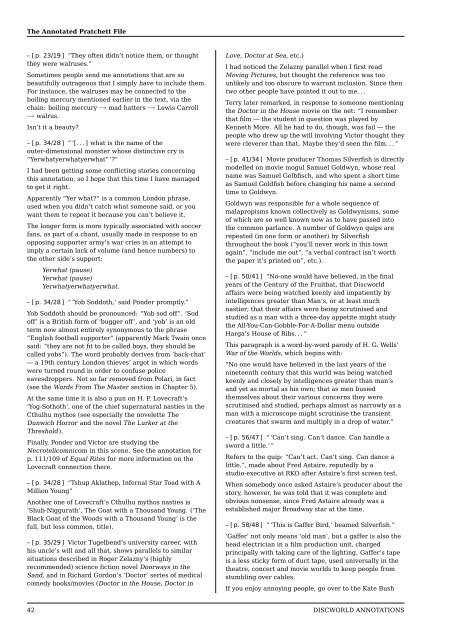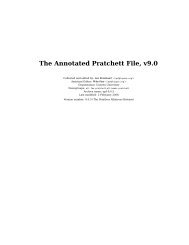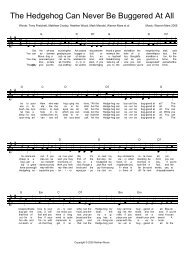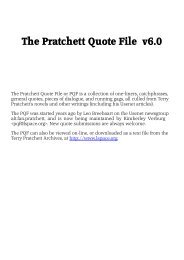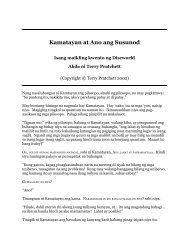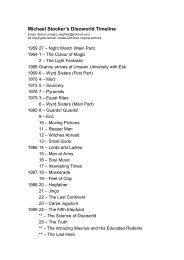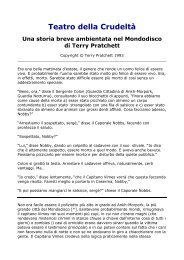The Annotated Pratchett File, v9.0 - The L-Space Web
The Annotated Pratchett File, v9.0 - The L-Space Web
The Annotated Pratchett File, v9.0 - The L-Space Web
You also want an ePaper? Increase the reach of your titles
YUMPU automatically turns print PDFs into web optimized ePapers that Google loves.
<strong>The</strong> <strong>Annotated</strong> <strong>Pratchett</strong> <strong>File</strong><br />
– [ p. 23/19 ] “<strong>The</strong>y often didn’t notice them, or thought<br />
they were walruses.”<br />
Sometimes people send me annotations that are so<br />
beautifully outrageous that I simply have to include them.<br />
For instance, the walruses may be connected to the<br />
boiling mercury mentioned earlier in the text, via the<br />
chain: boiling mercury → mad hatters → Lewis Carroll<br />
→ walrus.<br />
Isn’t it a beauty<br />
– [ p. 34/28 ] “ ‘[. . . ] what is the name of the<br />
outer-dimensional monster whose distinctive cry is<br />
“Yerwhatyerwhatyerwhat” ’”<br />
I had been getting some conflicting stories concerning<br />
this annotation, so I hope that this time I have managed<br />
to get it right.<br />
Apparently “Yer what” is a common London phrase,<br />
used when you didn’t catch what someone said, or you<br />
want them to repeat it because you can’t believe it.<br />
<strong>The</strong> longer form is more typically associated with soccer<br />
fans, as part of a chant, usually made in response to an<br />
opposing supporter army’s war cries in an attempt to<br />
imply a certain lack of volume (and hence numbers) to<br />
the other side’s support:<br />
Yerwhat (pause)<br />
Yerwhat (pause)<br />
Yerwhatyerwhatyerwhat.<br />
– [ p. 34/28 ] “ ‘Yob Soddoth,’ said Ponder promptly.”<br />
Yob Soddoth should be pronounced: “Yob sod off”. ‘Sod<br />
off’ is a British form of ‘bugger off’, and ‘yob’ is an old<br />
term now almost entirely synonymous to the phrase<br />
“English football supporter” (apparently Mark Twain once<br />
said: “they are not fit to be called boys, they should be<br />
called yobs”). <strong>The</strong> word probably derives from ‘back-chat’<br />
— a 19th century London thieves’ argot in which words<br />
were turned round in order to confuse police<br />
eavesdroppers. Not so far removed from Polari, in fact<br />
(see the Words From <strong>The</strong> Master section in Chapter 5).<br />
At the same time it is also a pun on H. P. Lovecraft’s<br />
‘Yog-Sothoth’, one of the chief supernatural nasties in the<br />
Cthulhu mythos (see especially the novelette <strong>The</strong><br />
Dunwich Horror and the novel <strong>The</strong> Lurker at the<br />
Threshold ).<br />
Finally, Ponder and Victor are studying the<br />
Necrotelicomnicom in this scene. See the annotation for<br />
p. 111/109 of Equal Rites for more information on the<br />
Lovecraft connection there.<br />
– [ p. 34/28 ] “Tshup Aklathep, Infernal Star Toad with A<br />
Million Young”<br />
Another one of Lovecraft’s Cthulhu mythos nasties is<br />
‘Shub-Niggurath’, <strong>The</strong> Goat with a Thousand Young. (‘<strong>The</strong><br />
Black Goat of the Woods with a Thousand Young’ is the<br />
full, but less common, title).<br />
– [ p. 35/29 ] Victor Tugelbend’s university career, with<br />
his uncle’s will and all that, shows parallels to similar<br />
situations described in Roger Zelazny’s (highly<br />
recommended) science fiction novel Doorways in the<br />
Sand, and in Richard Gordon’s ‘Doctor’ series of medical<br />
comedy books/movies (Doctor in the House, Doctor in<br />
Love, Doctor at Sea, etc.)<br />
I had noticed the Zelazny parallel when I first read<br />
Moving Pictures, but thought the reference was too<br />
unlikely and too obscure to warrant inclusion. Since then<br />
two other people have pointed it out to me. . .<br />
Terry later remarked, in response to someone mentioning<br />
the Doctor in the House movie on the net: “I remember<br />
that film — the student in question was played by<br />
Kenneth More. All he had to do, though, was fail — the<br />
people who drew up the will involving Victor thought they<br />
were cleverer than that. Maybe they’d seen the film. . . ”<br />
– [ p. 41/34 ] Movie producer Thomas Silverfish is directly<br />
modelled on movie mogul Samuel Goldwyn, whose real<br />
name was Samuel Gelbfisch, and who spent a short time<br />
as Samuel Goldfish before changing his name a second<br />
time to Goldwyn.<br />
Goldwyn was responsible for a whole sequence of<br />
malapropisms known collectively as Goldwynisms, some<br />
of which are so well known now as to have passed into<br />
the common parlance. A number of Goldwyn quips are<br />
repeated (in one form or another) by Silverfish<br />
throughout the book (“you’ll never work in this town<br />
again”, “include me out”, “a verbal contract isn’t worth<br />
the paper it’s printed on”, etc.).<br />
– [ p. 50/41 ] “No-one would have believed, in the final<br />
years of the Century of the Fruitbat, that Discworld<br />
affairs were being watched keenly and impatiently by<br />
intelligences greater than Man’s, or at least much<br />
nastier; that their affairs were being scrutinised and<br />
studied as a man with a three-day appetite might study<br />
the All-You-Can-Gobble-For-A-Dollar menu outside<br />
Harga’s House of Ribs. . . ”<br />
This paragraph is a word-by-word parody of H. G. Wells’<br />
War of the Worlds, which begins with:<br />
“No one would have believed in the last years of the<br />
nineteenth century that this world was being watched<br />
keenly and closely by intelligences greater than man’s<br />
and yet as mortal as his own; that as men busied<br />
themselves about their various concerns they were<br />
scrutinised and studied, perhaps almost as narrowly as a<br />
man with a microscope might scrutinise the transient<br />
creatures that swarm and multiply in a drop of water.”<br />
– [ p. 56/47 ] “ ‘Can’t sing. Can’t dance. Can handle a<br />
sword a little.’ ”<br />
Refers to the quip: “Can’t act. Can’t sing. Can dance a<br />
little.”, made about Fred Astaire, reputedly by a<br />
studio-executive at RKO after Astaire’s first screen test.<br />
When somebody once asked Astaire’s producer about the<br />
story, however, he was told that it was complete and<br />
obvious nonsense, since Fred Astaire already was a<br />
established major Broadway star at the time.<br />
– [ p. 58/48 ] “ ‘This is Gaffer Bird,’ beamed Silverfish.”<br />
‘Gaffer’ not only means ‘old man’, but a gaffer is also the<br />
head electrician in a film production unit, charged<br />
principally with taking care of the lighting. Gaffer’s tape<br />
is a less sticky form of duct tape, used universally in the<br />
theatre, concert and movie worlds to keep people from<br />
stumbling over cables.<br />
If you enjoy annoying people, go over to the Kate Bush<br />
42 DISCWORLD ANNOTATIONS


